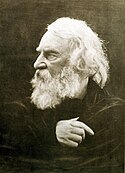Henry Wadsworth Longfellow Quote
The day is done, and the darknessFalls from the wings of Night,As a feather is wafted downwardFrom an eagle in his flight.I see the lights of the villageGleam through the rain and the mist,And a feeling of sadness comes o'er meThat my soul cannot resist:A feeling of sadness and longing,That is not akin to pain,And resembles sorrow onlyAs the mist resembles the rain.Come, read to me some poem,Some simple and heartfelt lay,That shall soothe this restless feeling,And banish the thoughts of day.Not from the grand old masters,Not from the bards sublime,Whose distant footsteps echoThrough the corridors of Time.For, like strains of martial music,Their mighty thoughts suggestLife's endless toil and endeavor;And to-night I long for rest.Read from some humbler poet,Whose songs gushed from his heart,As showers from the clouds of summer,Or tears from the eyelids start;Who, through long days of labor,And nights devoid of ease,Still heard in his soul the musicOf wonderful melodies.Such songs have power to quietThe restless pulse of care,And come like the benedictionThat follows after prayer.Then read from the treasured volumeThe poem of thy choice,And lend to the rhyme of the poetThe beauty of thy voice.And the night shall be filled with music,And the cares, that infest the day,Shall fold their tents, like the Arabs,And as silently steal away.
The day is done, and the darknessFalls from the wings of Night,As a feather is wafted downwardFrom an eagle in his flight.I see the lights of the villageGleam through the rain and the mist,And a feeling of sadness comes o'er meThat my soul cannot resist:A feeling of sadness and longing,That is not akin to pain,And resembles sorrow onlyAs the mist resembles the rain.Come, read to me some poem,Some simple and heartfelt lay,That shall soothe this restless feeling,And banish the thoughts of day.Not from the grand old masters,Not from the bards sublime,Whose distant footsteps echoThrough the corridors of Time.For, like strains of martial music,Their mighty thoughts suggestLife's endless toil and endeavor;And to-night I long for rest.Read from some humbler poet,Whose songs gushed from his heart,As showers from the clouds of summer,Or tears from the eyelids start;Who, through long days of labor,And nights devoid of ease,Still heard in his soul the musicOf wonderful melodies.Such songs have power to quietThe restless pulse of care,And come like the benedictionThat follows after prayer.Then read from the treasured volumeThe poem of thy choice,And lend to the rhyme of the poetThe beauty of thy voice.And the night shall be filled with music,And the cares, that infest the day,Shall fold their tents, like the Arabs,And as silently steal away.
Related Quotes
I am a lover of words and tragically beautiful things, poor timing and longing, and all things with soul, and I wonder if that means I am entirely broken, or if those are the things that have been kee...
Cathy, don't look so defeated. She was only trying to put us downagain.Maybe nothing did work out right for her, but that doesn't mean we aredoomed. Let's go forth tomorrow with no great expectations...
About Henry Wadsworth Longfellow
Longfellow was born in Portland, District of Maine, Massachusetts (now Portland, Maine). He graduated from Bowdoin College and became a professor there and, later, at Harvard College after studying in Europe. His first major poetry collections were Voices of the Night (1839) and Ballads and Other Poems (1841). He retired from teaching in 1854 to focus on his writing, and he lived the remainder of his life in the Revolutionary War headquarters of George Washington in Cambridge, Massachusetts.
His first wife, Mary Potter, died in 1835 after a miscarriage. His second wife, Frances Appleton, died in 1861 after sustaining burns when her dress caught fire. After her death, Longfellow had difficulty writing poetry for a time and focused on translating works from foreign languages. Longfellow died in 1882.
Longfellow wrote many lyric poems known for their musicality and often presenting stories of mythology and legend. He became the most popular American poet of his day and had success overseas. He has been criticized for imitating European styles and writing poetry that was too sentimental.
